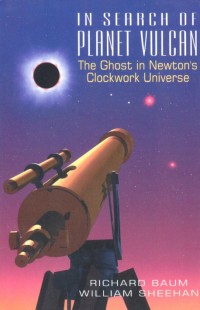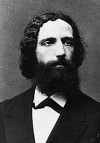In Search of Planet Vulcan: The Ghost in Newton’s Clockwork Universe

 By Richard Baum and William Sheehan.
By Richard Baum and William Sheehan.
Plenum Publishing Corporation, New York, 1997 Click to Buy this Book!
On the back flap of the jacket cover, the publisher summarizes this book as one that “will hold you spellbound from beginning to end. An irresistible tale of human eccentricity … destined to become a classic.” Authors Richard Baum, former Vice President of the British Astronomical Association, and Dr. William Sheehan, an amateur astronomer and a psychiatrist by profession, present a highly readable history of astronomy regarding the search for additional planets in the solar system, a search that intensified after William Herschel discovered Uranus in 1781. Attempts to explain observations of Uranus’ “wayward movements” led, through applications of Newton’s laws or “celestial mechanics,” to the sensational discovery of a second new outer planet, later named Neptune. Neptune was discovered in 1846 by the great French mathematician and astronomer Urbain Jean Joseph Le Verrier (1811–1877), not from observations, but from calculations alone. The new planet was then observed in the exact position of Le Verrier’s calculations by Johann Gottfried Galle and his assistant on September 23, 1846.
The title of the book, the cover art, the photograph of the statue of U.J.J. Le Verrier across from the title page, the emphasis on the name Vulcan, and the publisher’s comments, above, are all somewhat slanted towards the entertainment value of the book (Richard Baum was involved in the Vulcan episode of the television documentary series Arthur C. Clarke’s Mysterious World). The authors, however, do offer clear, informative history, helpful clarifications of astronomical theory and calculus, interesting biographies, and many humorous touches, all leading up to and including the quest for an intra-mercurial planet to explain the “anomalous advance of the perihelion of Mercury.” Searches for trans-Neptunian planets (e.g., the discovery of Pluto) are also described, from the time of Herschel up until the late 20th century. From the Epilogue: “Compared to the substantial gas giants sunwards of it, Pluto is a mere planetary soufflé, a creampuff planet … although it might be argued that Pluto does have a small moon — Charon, discovered only in 1978 — and an atmosphere.” More »
